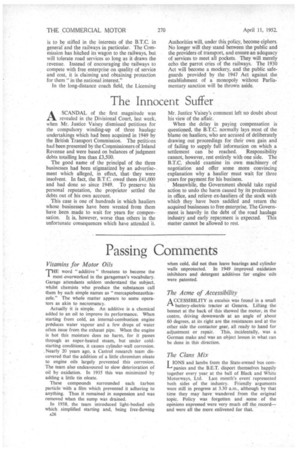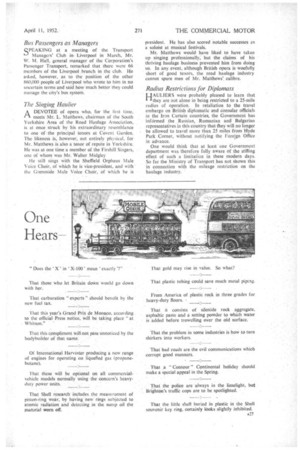Passing Comments
Page 28

Page 29

If you've noticed an error in this article please click here to report it so we can fix it.
Vitamins for Motor Oils
THE word " additive " threatens to become the most 'overworked in the garageman's vocabulary. Garage attendants seldom understand the subject, whilst chemists who produce the substances call them by such simple names as " mercaptobenzothiazole." The whole matter appears to some operators as akin to necromancy.
Actually it is simple. An additive is a chemical added to an oil to improve its performance. When starting from cold, an internal-combustion engine produces water vapour and a few drops of water often issue from the exhaust pipe. When the engine is hot this moisture does no harm, for it passes through as super-heated steam, but under coldstarting conditions, it causes cylinder-wall corrosion. Nearly 20 years ago, a Castro] research team discovered that the addition of a little chromium oleate to engine oils largely prevented this corrosion. The team also endeavoured to slow deterioration of oil by oxidation. In 1935 this was minimized by adding a little tin oleate.
These compounds surrounded each tarbon particle with a film which prevented it adhering to anything. Thus it remained in suspension and was removed when the sump was drained. In 1938, the team introduced light-bodied oils which simplified starting and, being free-flowing A26
when cold, did not then leave bearings and cylinder walls unprotected. In 1949 improved oxidation inhibitors and detergent additives for engine oils were patented.
The Acme of Accessibility
CCESSIBILITY in excelsis was found in a small 1-1.A battery-electric tractor at Geneva. Lifting the bonnet at the back of this showed the motor, in the centre, driving downwards at an angle of about 60 degrees, at its right are the resistances and at the other side the contactor gear, all ready to hand for adjustment or repair. This, incidentally, was a German make and was an object lesson in what can be done in this direction.
The Clans Mix
LIONS and lambs from the State-owned bus com panies and the B.E.T. disport themselves happily together every year at the ball of Black and White Motorways, Ltd. Last month's event represented both sides of the industry. Friendly arguments were still in progress at 3.30 a.m., although by that time they may have wandered from the original topic. Policy was forgotten and some of the opinions expressed were very much off the record— and were all the more enlivened for that.
Bus Passengers as Managers
SPEAKING at a meeting of the Transport Managers' Club in Liverpool in March, Mr. W. M. Hall, general manager of the Corporation's Passenger Transport, remarked that there were 66 members of the Liverpool branch in the club. He asked, however, as to the position of the other 860,000 people of Liverpool who wrote to him in no uncertain terms and said how much better they could manage the city's bus system.
The Singing Haulier
A DEVOTEE of opera who, for the first time,
meets Mr. L. Matthews, chairman of the South Yorkshire Area of the Road Haulage Association, is at once struck by his extraordinary resemblance to one of the principal :tenors at Covent Garden. The likeness is, however, not entirely physical, for Mr. Matthews is also a tenor of repute in Yorkshire. He was at one time 'a member of the Firshill Singers, . one of whom was Mr. Walter Midgley He still sings with the Sheffield Orpheus Male Voice Choir, of which he is vice-president, and with the Grenoside Male Voice Choir, of which he is president. He has also scored notable successes as a soloist at musical festivals.
Mr. Matthews would have liked to have taken up singing professionally," but the claims of his thriving haulage business prevented him from doing so. In any. event, although British opera is woefully short of good tenors, the road haulage industry cannot spare men of Mr. Matthews', calibre.
Radius Restrictions for Diplomats
HAULIERS were probably pleased to learn that "they are not alone in being restricted to a 25-mile radius of operation. In retaliation to the travel embargo on British diplomatic and consular officials in the Iron Curtain countries., the Government has informed the , Russian, Rumanian and Bulgarian representatives in this country that they will no longer be allowed to travel more than 25 miles from Hyde Park Corner, without notifying the Foreign Office in advance.
One would think that at least one Government department was therefore fully aware of the stifling effect of such a limitation in these .modern days. So far the Ministry of Transport has not shown this in connection with the mileage restriction on the haulage industry.




















































































